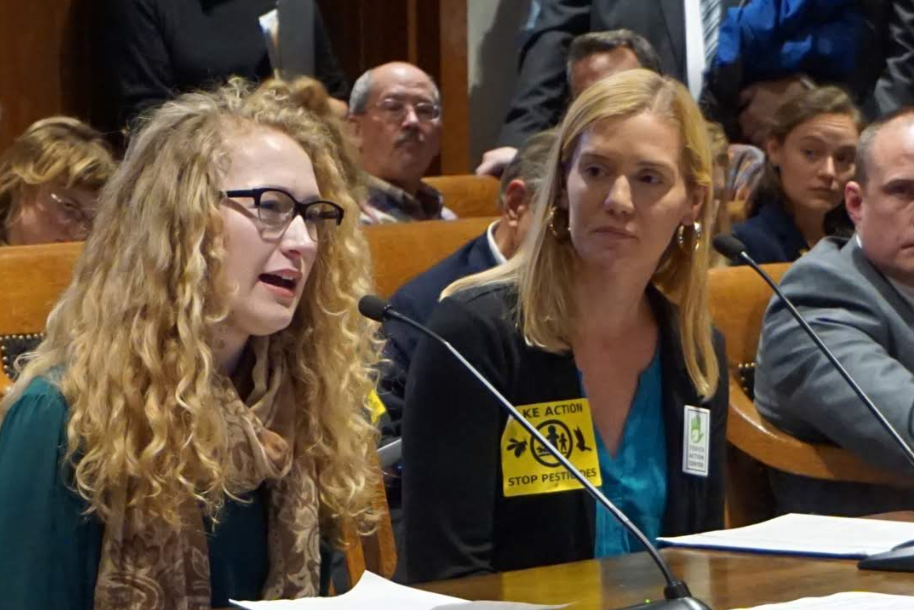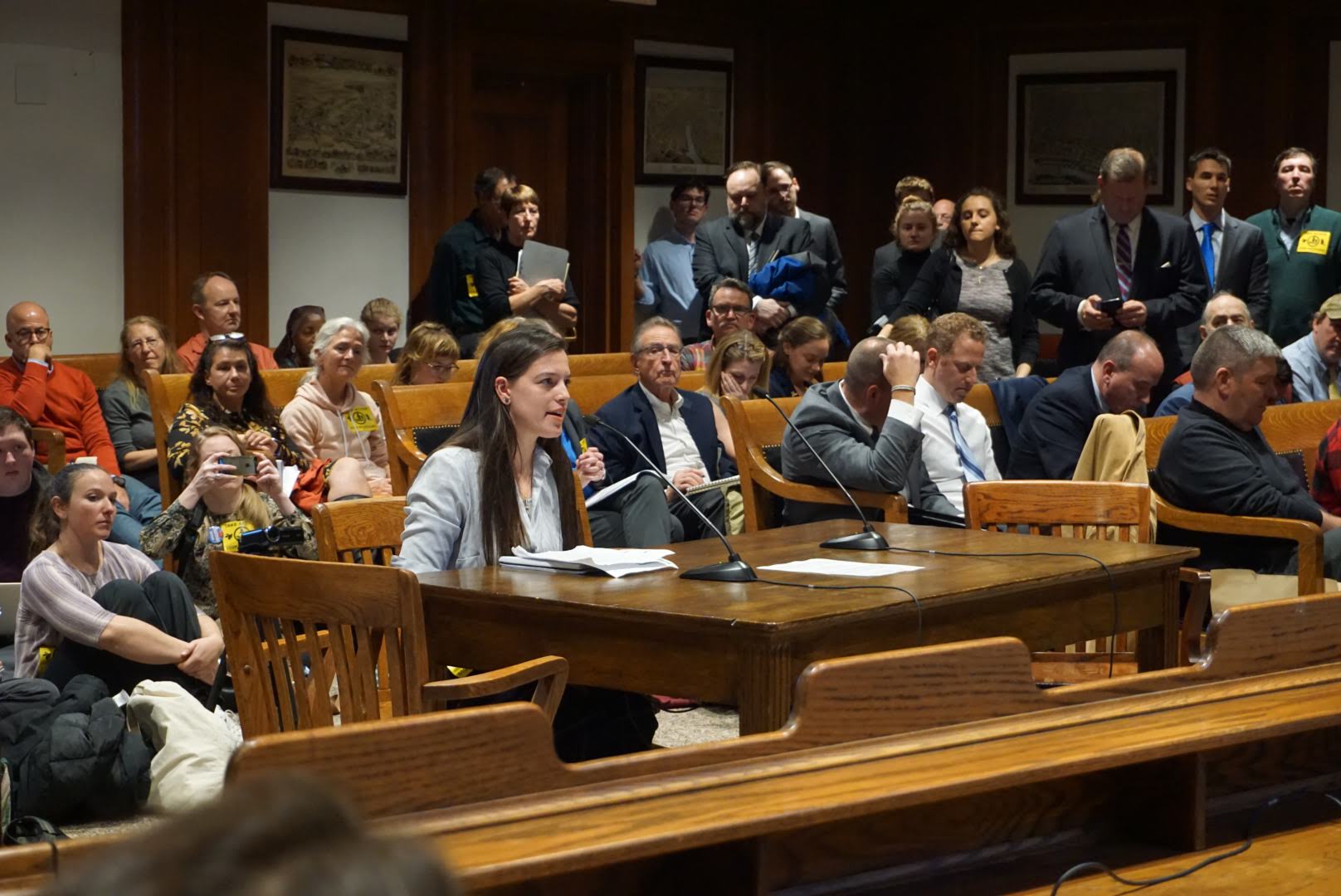
MASSPIRG Urges Lawmakers to Protect the Bees and Ban the use of the dangerous pesticide RoundUp, on Playgrounds and Public Land
Testifying before the Legislature’s Joint Committee on Environment, Natural Resources and Agriculture, MASSPIRG urged for swift passage of two important public health bills, H. 763, An Act to protect Massachusetts pollinators and HB 763, An Act to protect Massachusetts pollinators.
MASSPIRG Urges Lawmakers to Protect the Bees and Ban the use of the dangerous pesticide RoundUp, on Playgrounds and Public Land
(Boston) Testifying before the Legislature’s Joint Committee on Environment, Natural Resources and Agriculture, MASSPIRG urged for swift passage of two important public health bills, H. 763, An Act to protect Massachusetts pollinators and S. 499, An Act relative to the use of Glyphosate on public lands
Saving the Bees
H. 763, An Act to protect Massachusetts pollinators, was filed by Representative Carolyn Dykema and a bipartisan group of 153 legislative sponsors, and supported by Attorney General Maura Healey and more than 100 local organizations.
In the last decade, declining pollinator health, specifically among honeybee and wild bee populations, has been a cause for concern both in Massachusetts and around the country. In 2017, Massachusetts beekeepers reported a 64.9 percent annual loss in colony numbers.
You can imagine that bees play a role in the ecosystem so losing bees matters. But what we also know is that if we lose all our bees, our food supply will be dramatically affected. Bees pollinate much of the food we depend on. Without bees we wouldn’t have apples, broccoli, coffee beans or even chocolate. And bees pollinate alfalfa, one of the main crops on which dairy cows feed. Which means that bees affect whether we have milk, cheese and ice cream. In fact, 71 out of 100 crop species which provide 90% of food worldwide are bee-pollinated.
It’s simple: without bees, we don’t have food. The loss of bees will severely impact $15 billion of the US’s annual food supply if we don’t do something.

Caption: Katherine Kjaer, a junior at the University of Massachusetts, Amherst representing MASSPIRG Students testified in support of the Pollinator Bill before the Joint Committee on Environment, Natural Resources and Agriculture. Photo credit: staff
Based on mounting evidence, many scientists and beekeepers have identified the introduction of neonicotinoid pesticides as a primary reason for pollinator health decline. Neonicotinoids are a relatively new class of insecticides that, since their discovery in the 1980s, have become the most widely used insecticide worldwide. Neonicotinoid manufacturers and distributors, such as Dow Chemical, Bayer, and Monsanto, ramped up the use of these insecticides in the mid-2000s. These insecticides are now sprayed on most flower and tree seeds before they can even be bought in stores.
HB 763, An Act to protect Massachusetts pollinators will restrict the use of these pesticides to those certified and licensed applicators and encourage more bee friendly landscaping on some public land.
Banning Glyphosate on Public Land
MASSPIRG also testified in support of S. 499, An Act relative to the use of Glyphosate on public lands, filed by Senator Jason Lewis.
The World Health Organization has warned that the main ingredient in Monsanto’s Roundup, glyphosate, is a probable human carcinogen. Despite the risks we spray 26 million pounds of Roundup on public parks, playgrounds, schools and gardens every year. And now studies are finding glyphosate in places it shouldn’t be including cereals, beer, ice cream, and our bodies.
Further, children are put at a higher risk of being exposed to glyphosate, as they roll in the grass, wash their hands less, and some young children even eat the grass.
S. 499, An Act relative to the use of Glyphosate on public lands, takes the first step to reduce exposure and use of Roundup by preventing the use of Round Up in our parks, schools and other public lands. This is an opportunity to replace a harmful and dangerous practice with a sustainable and healthy one.

Chanah Haigh, MASSPIRG’s policy intern, testifying in favor of S. 499 to ban the use of Glyphosate in parks, playgrounds and public lands. Photo credit: Staff
See detailed testimony
Pollinator bill, https://masspirg.org/resources/map/pollinator-testimony-111219
Glyphosate, https://masspirg.org/resources/map/testimony-s499-act-relative-use-glyphosate-public-lands
Authors
Deirdre Cummings
Legislative Director, MASSPIRG
Deirdre runs MASSPIRG’s public health, consumer protection and tax and budget programs. Deirdre has led campaigns to improve public records law and require all state spending to be transparent and available on an easy-to-use website, close $400 million in corporate tax loopholes, protect the state’s retail sales laws to reduce overcharges and preserve price disclosures, reduce costs of health insurance and prescription drugs, and more. Deirdre also oversees a Consumer Action Center in Weymouth, Mass., which has mediated 17,000 complaints and returned $4 million to Massachusetts consumers since 1989. Deirdre currently resides in Maynard, Mass., with her family. Over the years she has visited all but one of the state's 351 towns — Gosnold.